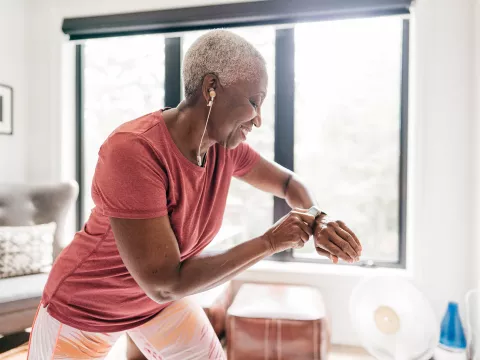- AdventHealth

Our bones support our bodies and help us do the things we love. They power our daily walks, allow us to embrace our friends, and get things done at home and at work.
With all our bones do, it’s important to keep them healthy and strong. That includes a nutritious diet and regular exercise. It also means bone health screenings with your doctor. Screenings may be as simple as a blood test to monitor your vitamin D levels or, when you reach a certain age, regular DEXA scans.
What Is a DEXA Scan?
A DEXA scan (dual X-ray absorptiometry) helps measures the strength and density of your bones. DEXA (or DXA) can diagnosis osteoporosis, a common condition in which bones become brittle and weak. Osteoporosis can increase your risk of fracturing a bone. Recovering from a fracture can also take longer with osteoporosis.
Who Should Get a DEXA Scan?
Osteoporosis mostly affects older women. Your doctor may recommend a DEXA scan if you’re a woman over the age 65 or if you’re age 60 or older with a higher risk of fractures.
What Happens During a DEXA Scan?
DEXA scans are painless and relatively quick, taking only about 10 – 20 minutes. The scan uses X-rays to take pictures of your bones, typically your hips and spine. You can also get a scan of your forearms.
During the scan, you’ll need to lie still on an open X-ray table as the machine takes pictures. The scanner uses two X-ray beams, one high energy and one low energy. Scans measure how much of the X-ray passes through the bone, which allows your doctor to check your bone density.
How Do I Read My DEXA Results?
Your doctor will notify you of your results after your scan. Results are given as a “T-score,” which compares your bone density to a healthy 30-year-old. T-score ranges include:
- Normal bone density: -1.0 or above
- Low bone density (osteopenia): -1.0 and -2.5
- Osteoporosis: -2.5 or lower
Your doctor may also give you a Z-score, which compares your bones to a normal score from people your age.
How Do I Protect My Bone Health?
Maintaining strong bones is an important part of your whole health. A few simple activities and foods can help protect your bone health:
Add Strength Training to Your Workout Routine
You likely know that lifting weights or incorporating resistance bands to your workout routine helps keep your muscles strong. But what you may not realize is that these are also great bone-building exercises. Add strength training to your exercise regimen to better protect and fortify your bones.
Eat and Drink Plenty of Calcium
Dairy isn’t the only food high in vitamins D and K. Try fish like salmon, whitebait or sardines. Green, leafy vegetables, such as spinach, collard greens and broccoli, are another good source of calcium.
Get Regular Exercise
Walking, swimming and biking are great ways to build muscle and strengthen your bones. But which exercise you choose is far less important than simply maintaining an exercise routine. Stick to activities you enjoy. Your bones will thank you.
Limit Alcohol and Stop Smoking
Tobacco use and excessive alcohol consumption are linked to bone density loss. Limiting or avoiding tobacco and alcohol can go a long way in keeping your bones healthy.
Take Vitamin D and Calcium Supplements
Vitamin D and calcium supplements can help strengthen your bones. But it’s important to talk with your doctor before you add any new vitamins or supplements to your health care routine. Look to your physician for guidance and to recommend the right dosage for you.
Schedule an Appointment Today
Your doctor may have other recommendations based on your age, medical history and family history. Request an appointment today to have your bone density checked and discuss bone health with your primary care provider.




